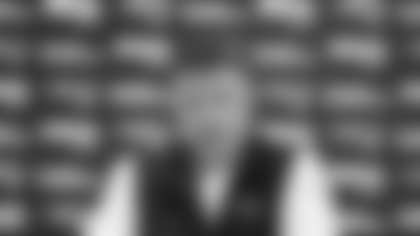Sixty-five yards per game may not seem like much.
Certainly not if you're an NFL running back. Not in a league where 100-yard games and 1,000-yard seasons are the benchmark by which your position is measured and judged.
So why is that the magic number for Laurence Maroney?
"If we get 60 to 70 yards a game, I think we can do it," the Patriots running back reasoned recently. "We got dreams of trying to do something that's … I don't think it's been done in the NFL."
Actually, Laurence, it has, but only thrice before: two backs, on the same team, each gaining 1,000 yards or more in the same season.
In 1972, Miami's Larry Csonka and Eugene "Mercury" Morris pioneered the feat. Four years later, Franco Harris and Rocky Bleier of Pittsburgh followed them. Since then, only the Cleveland Browns tandem of Earnest Byner and Kevin Mack have been able to accomplish it. Clearly, it's a difficult goal to reach.
At the same time, it's hard to argue with Maroney's math. If he and fellow Patriots tailback Sammy Morris (the other half of the 'we' he mentioned) average between 60 and 70 yards rushing per game this season, and they both play in all 16 regular season games, each will have gained more than 1,000 yards. To be precise, 62.5 yards per game is what's needed to reach 1,000 in 16 games.
Maroney missed three games and played sparingly in several others due to a groin injury last year. Yet, he still managed to pile up 835 yards on the ground. That averages out to a little more than 64 yards per game.
Morris, meanwhile, landed on injured reserve after suffering a sternum-clavicle separation in the Dallas game. After just six games in a New England uniform, he rushed for 384 yards – a total of exactly 64 yards per game.
Hmm … maybe Maroney's on to something.
"That's what Sammy and I are striving for," he added, "so, we've been working hard this offseason."
It's not impossible, but given the pass-happy Patriots offense, the opportunities for them to get enough carries to make that happen will likely be limited. The trick will be for both backs to put themselves in position to carry the ball for an entire season. Neither player has ever done so in his pro career. That frustrating fact gnaws at and motivates Maroney.
"They were average, decent," he remarked about his first two NFL seasons. "I progressed from both years. Now, I'm just looking to do better. I had good numbers last year and had to deal with a couple of injuries, so hopefully I stay injury-free this year."
A year ago at this time, Maroney was limited in his offseason workouts because of surgery on a nagging shoulder injury. This spring, Maroney is healthy and working out regularly, which he feels will benefit him come the fall.
"No major injuries. Body feels good. I feel good about it. I wasn't able to lift [last offseason], so I didn't have all my strength. I had to gain strength during the season. Now, I can start the season off with a full head of steam, full strength and speed. Hopefully, it'll be better for me, having gone through this offseason program."
Earlier this offseason, Morris stated that he was "really pleased" with his rehab progress, noting that by the Super Bowl, he was lifting weights again. However, a realistic Morris observed that he won't know for sure if he's fully healed until he puts the pads back on.
"That's the thing about this injury," he told The Boston Globe in March, "it's so rare that the only way to really find out if you are 100 percent is to start taking hits."
Maroney, it seems, is already convinced that Morris is good to go.
"It feels good to get Sammy back … we got high hopes this year."
It will help Maroney's cause if he can start the 2008 season the way he ended 2007, with four 100-yard performances and seven touchdowns in the Pats' final six games, including Super Bowl XLII. Prior to that streak, Maroney had only rushed for 100 yards in one other game last year (September 23 versus Buffalo).
All the while, Maroney knew he was capable of better, though at times, he admitted, self-doubt entered his mind.
"I used to question myself, saying, 'Why aren't I doing the same things I did in college?' But I got back to my old self and just played football the way I know how to play football. And in the second half of the year, it worked for me. That gives me a nice little run to start this season off with."
After his rookie season, Maroney said that his main focus heading into training camp in 2007 would be to gain a better grasp of the Patriots playbook. This summer, as Maroney's third training camp nears, his emphasis will be, as he put it, on getting bigger, faster, and stronger, and improving his knowledge of NFL defenses so as to attack them more effectively.
"I feel like this year is the year I have to stand out and separate myself from the pack," he declared.
For Morris, just getting back on the field is what he's concentrating on right now.
"I have a lot of incentive stored in the back of my mind, remembering how I felt on the sidelines, not being able to contribute," he said of his premature end to last season. The memory of that torment is what has been pushing Morris throughout the offseason.
Of course, while personal goals are important to Maroney, Morris, and every other individual player, team goals are paramount to the Patriots. And though Maroney claims he's not dwelling on the Patriots' shocking Super Bowl loss to the New York Giants, he's clearly using the title game experience as a reminder that team goals should always come first.
"I got a taste of it [playing in the Super Bowl] and I want to work hard to get back to it. Next time, we've got to seize the opportunity and get the victory."









































